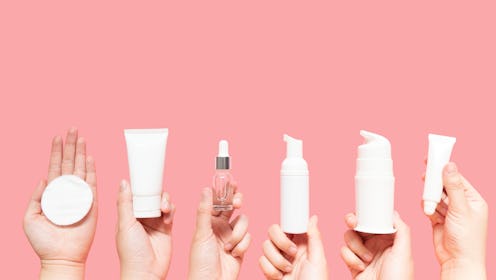Hand sanitizer is having a moment. Once the underdog of the personal care world, it is now front and center with the coming of the coronavirus. And with retailers selling out of the stuff at lightning rates, people are getting creative, concocting their own DIY formulas with the hopes of keeping germs, viruses, and the like off their skin. But this now-trendy makeshift practice begs the question of efficacy: Do homemade DIY hand sanitizers actually work in comparison to the store-bought variety? Or is everyone crafting in vain?
Now, to be clear, the Centers for Disease Control & Prevention (CDC) claims hand-washing with soap and water (warm or cold) for 20 seconds is the best way to keep your hands clean. Dr. Stephen Morse, Professor of Epidemiology at the Mailman School of Public Health, Columbia University says homemade hand sanitizers should be used as a convenience for occasions where soap and water are not readily available, or when there isn’t time to wash hands." In these cases, the CDC advises, “the use of alcohol-based hand sanitizers with greater than 60 percent ethanol or 70 percent isopropanol."
Dr. Sarah Hogan, a health sciences clinical instructor at the Geffen School of Medicine at UCLA and dermatologist at UCLA Medical Center, Santa Monica seconds the notion that washing one’s hands with soap and water is the preferred method over hand sanitizer (homemade or commercially bought), mainly because the former is more effective in killing microbes. “Certain microbes — bacteria like Staphylococcus species and Escherichia coli, and viruses like influenza A and coronavirus — can live on inanimate, dry surfaces for days to weeks, and in some cases, months," says Dr. Hogan. "Our hands invariably come into contact with these objects throughout the day. [...] The killing of microbes using hand sanitizer or hand washing, is thus crucial to stop infection and transmission of communicable disease."
That’s not to say hand sanitizer (DIY or otherwise) doesn’t have its purpose here. Doubling down and employing both methods is a solid plan of attack for keeping your hands and skin as clean as possible. “Homemade hand sanitizer containing at least 60 percent, ideally 70 percent or greater, of isopropyl or ethanol alcohol is likely as effective as manufactured hand sanitizer in killing bacteria and viruses," says Hogan of those going the homemade route. Dr. Morse explains that most recipes for homemade sanitizers call for isopropyl alcohol or ethanol and supplementary ingredients like aloe vera to make it gentler on the skin, easier to apply, and slow to evaporation (the solution needs to stay on for at least 15 seconds, so Dr. Morse says to let it air dry).
These simple and available ingredients — you can find them at most pharmacies and drug stores — seem easy enough to mix together, however, one wrong misstep can make your formula ineffective or even harmful to the skin, so treading carefully is crucial. “We’ve heard stories of some of the counterfeit products bursting into flames or causing chemical burns,” says Dr. Morse in an email to The Zoe Report. “So if you do make your own, make sure to use clearly labeled products from reputable sources.”
Dr. Hogan goes further with the precautions, explaining that any utensils and jars used should be thoroughly sterilized and that ingredients should be high-quality and exact. "The mixing process should be done in an open area since isopropyl alcohol and ethanol are flammable,” she says. “Any non-sterile ingredient can contaminate DIY hand sanitizer. Also, avoid moisturizing bases that contain sugars as these can provide media in which bacteria can grow.”
Speaking of moisturizing bases, sticking to a strict 2:1 ratio of alcohol to base is crucial, says Dr. Hogan. “DIY hand sanitizers with too much alcohol can be drying and irritating to skin,” she explains. “Alternatively, DIY hand sanitizers with too much of a moisturizing base are not as effective in killing microbes and viruses. The World Health Organization has a helpful guide to ‘local production of handrub’ that outlines the process in great detail. Due to these variables, I still recommend commercial hand sanitizer."
If you think you’re showing symptoms of coronavirus, which include fever, shortness of breath, and cough, call your doctor before going to get tested. If you’re anxious about the virus’s spread in your community, visit the CDC for up-to-date information and resources, or seek out mental health support.
